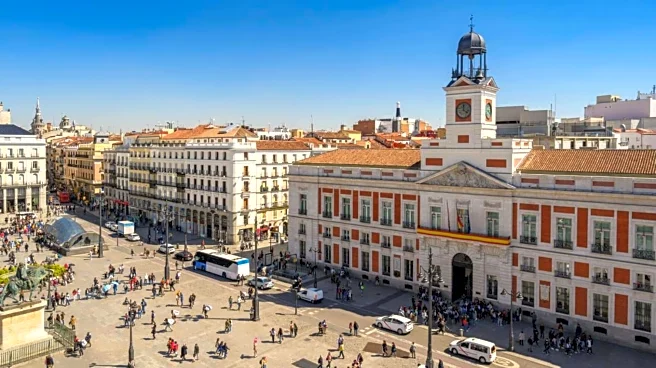What is the story about?
Bajaj Auto Managing Director Rajiv Bajaj has attributed the financial and operational difficulties at Austrian motorcycle maker KTM to “corporate greed.” In an exclusive interview with CNBC-TV18, he said, “The single biggest reason for corporate demise is corporate greed, and that has unfortunately played out at KTM over the past 12 months.”
Bajaj Auto is awaiting approval from the European Union’s takeover commission, expected by November, to complete its acquisition of KTM . The move comes after KTM’s financial crisis last year, which forced the company to seek legal restructuring due to severe liquidity issues.
At the time, Bajaj Auto extended an €800 million support package, including a €566 million loan, to stabilise KTM. Once approved, Bajaj Auto’s stake will increase from a 49.9% minority holding to 76%, giving it a controlling interest in the company.
According to Bajaj, KTM’s decline was partly due to strategic missteps. “KTM made a strategic mistake by entering the electric bicycle business. Entering businesses with no synergy with your core operations was a major error,” he said.
Overproduction also contributed to the crisis, with dealers reportedly left holding more than a year’s worth of inventory.
Bajaj added that some poor decisions were driven by the pursuit of valuations. “KTM, in chasing valuations, took decisions that should not have been pursued,” he said, emphasising that the previous top leadership, now replaced, was largely responsible for these missteps.
“Mistakes at KTM were due to the top leadership, which is now gone. We have an all-new leadership team comprising experienced colleagues and new appointments, including a CFO and CHRO.”
On the Indian market, Bajaj said KTM sales are up 70% year-on-year, helped by GST reductions and the launch of the new KTM Duke. “This month, we will record the highest KTM sales in our 18-year association in India,” he added.
Export operations, including to the US, continue uninterrupted, with the cost-competitiveness of the Indian supply chain helping absorb tariffs.
Bajaj also outlined plans to restructure KTM’s supply chain and cut costs. “Restructuring the supply chain and moving certain operations to lower-cost regions in Europe and beyond is the way forward. There is an opportunity to reduce KTM’s overheads by 50%,” he said.
KTM has already reduced its headcount from 6,000 to 4,000, though he noted that only 1,000 of these are blue-collar workers, with the remaining 3,000 being white-collar staff.
Bajaj added that the focus will be on restoring confidence in the KTM brand and aligning stakeholders. “We need clear alignment among all KTM stakeholders to deliver great products and an exceptional customer experience. KTM under Bajaj Auto remains open to meaningful partnerships; there have been discussions with BMW in the past,” he said.
“Our immediate priority is obtaining approval for Bajaj Auto’s takeover of KTM. Once that is done, KTM will be ready to race,” he concluded.
Bajaj Auto is awaiting approval from the European Union’s takeover commission, expected by November, to complete its acquisition of KTM . The move comes after KTM’s financial crisis last year, which forced the company to seek legal restructuring due to severe liquidity issues.
At the time, Bajaj Auto extended an €800 million support package, including a €566 million loan, to stabilise KTM. Once approved, Bajaj Auto’s stake will increase from a 49.9% minority holding to 76%, giving it a controlling interest in the company.
According to Bajaj, KTM’s decline was partly due to strategic missteps. “KTM made a strategic mistake by entering the electric bicycle business. Entering businesses with no synergy with your core operations was a major error,” he said.
Overproduction also contributed to the crisis, with dealers reportedly left holding more than a year’s worth of inventory.
Bajaj added that some poor decisions were driven by the pursuit of valuations. “KTM, in chasing valuations, took decisions that should not have been pursued,” he said, emphasising that the previous top leadership, now replaced, was largely responsible for these missteps.
“Mistakes at KTM were due to the top leadership, which is now gone. We have an all-new leadership team comprising experienced colleagues and new appointments, including a CFO and CHRO.”
On the Indian market, Bajaj said KTM sales are up 70% year-on-year, helped by GST reductions and the launch of the new KTM Duke. “This month, we will record the highest KTM sales in our 18-year association in India,” he added.
Export operations, including to the US, continue uninterrupted, with the cost-competitiveness of the Indian supply chain helping absorb tariffs.
Bajaj also outlined plans to restructure KTM’s supply chain and cut costs. “Restructuring the supply chain and moving certain operations to lower-cost regions in Europe and beyond is the way forward. There is an opportunity to reduce KTM’s overheads by 50%,” he said.
KTM has already reduced its headcount from 6,000 to 4,000, though he noted that only 1,000 of these are blue-collar workers, with the remaining 3,000 being white-collar staff.
Bajaj added that the focus will be on restoring confidence in the KTM brand and aligning stakeholders. “We need clear alignment among all KTM stakeholders to deliver great products and an exceptional customer experience. KTM under Bajaj Auto remains open to meaningful partnerships; there have been discussions with BMW in the past,” he said.
“Our immediate priority is obtaining approval for Bajaj Auto’s takeover of KTM. Once that is done, KTM will be ready to race,” he concluded.
/images/ppid_59c68470-image-176070761748223298.webp)

/images/ppid_59c68470-image-177082253958777729.webp)
/images/ppid_59c68470-image-177082253393829449.webp)





/images/ppid_a911dc6a-image-17708236282147011.webp)






